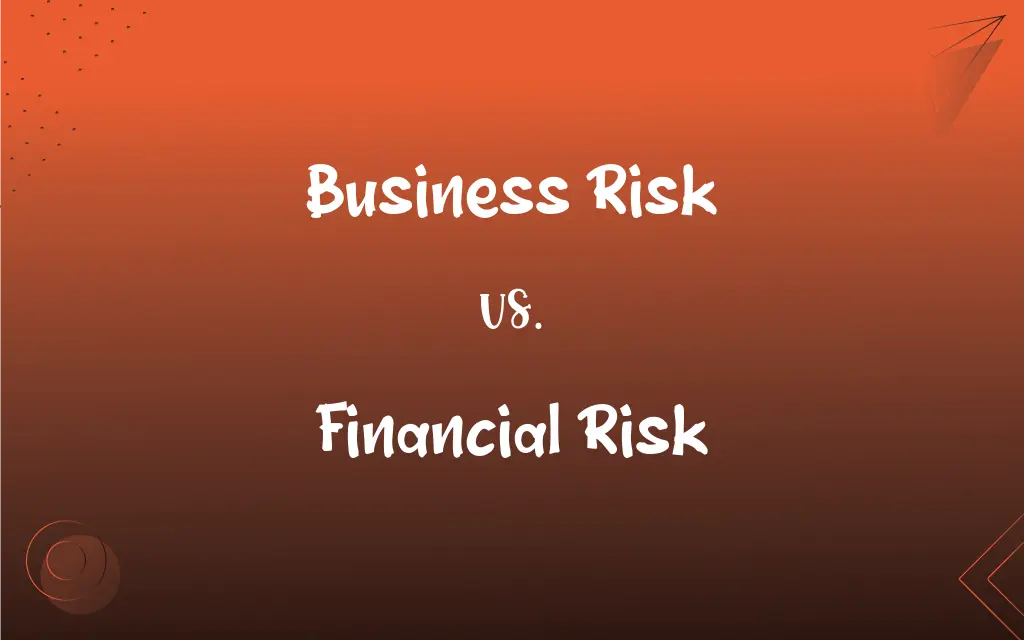Business Risk vs. Financial Risk: What's the Difference?
Edited by Aimie Carlson || By Harlon Moss || Published on November 26, 2023
Business risk relates to the company's operations and market environment, while financial risk pertains to managing debt and the cost of capital.

Key Differences
Business risk arises from factors affecting the company's daily operations and overall industry, like changes in consumer demand or production issues. Financial risk, however, is associated with the management of financial obligations, particularly debt and interest rates.
Business risk is influenced by market conditions, competition, and technological changes. Financial risk revolves around financial strategies, such as capital structure decisions, and the potential inability to meet financial obligations.
Business risk encompasses both internal factors like operational efficiency and external factors like market volatility. In contrast, financial risk is predominantly about the decisions a company makes regarding its finances, like leverage and liquidity management.
Business risk directly impacts a company's revenue and profitability due to operational inefficiencies or market downturns. Financial risk, on the other hand, impacts the company's solvency and creditworthiness, affecting its capacity to secure funds and manage debt.
Managing business risk often involves diversifying product lines and markets, and improving operational efficiency. Managing financial risk requires prudent financial planning, maintaining adequate liquidity, and managing interest rate and credit risks.
ADVERTISEMENT
Comparison Chart
Nature
Related to operations and market environment
Concerned with managing debt and capital
Influences
Market conditions, competition, operational efficiency
Financial strategies, leverage, interest rates
Impact
Affects revenue and profitability
Affects solvency and creditworthiness
Management
Diversification, operational improvements
Financial planning, liquidity management
Example
Changes in consumer preferences impacting sales
Interest rate fluctuations affecting loan repayments
ADVERTISEMENT
Business Risk and Financial Risk Definitions
Business Risk
The risk arising from the industry and market where a business operates.
Technological advancements in the industry introduced new business risks.
Financial Risk
The risk of a company failing to meet its financial obligations.
The company's high debt levels increased its financial risk significantly.
Business Risk
The risk associated with a firm's ability to generate sufficient revenue.
The business risk for the new startup increased due to high competition.
Financial Risk
The risk associated with managing a company's debt and financial leverage.
Rising interest rates posed a serious financial risk to the heavily leveraged firm.
Business Risk
The uncertainty stemming from the operational environment of a business.
A sudden shift in market trends poses a significant business risk to traditional retailers.
Financial Risk
The possibility of a loss resulting from a company's credit management.
Poor credit control practices increased the company's financial risk.
Business Risk
The inherent risk in the business model and strategy.
Entering a new market carries a considerable business risk due to unknown factors.
Financial Risk
The risk related to the cost of capital and financing decisions.
Choosing aggressive financing options introduced higher financial risk.
Business Risk
The potential for losses due to factors affecting the company’s operations.
Supply chain disruptions led to an elevated business risk for manufacturers.
Financial Risk
The potential for financial losses due to market fluctuations in interest or exchange rates.
Foreign exchange volatility heightened the company's financial risk.
FAQs
What are common causes of business risk?
Market competition, consumer preferences, and operational challenges.
What is business risk?
It's the risk associated with a company's operations and market environment.
How does financial risk differ from business risk?
Financial risk is specifically related to managing debt and the cost of capital.
Can a company have low business risk but high financial risk?
Yes, if it operates efficiently but has high debt or poor financial management.
Does financial risk include credit risk?
Yes, it encompasses risks related to credit management.
How can a company manage business risk?
Through diversification, operational efficiency, and market research.
What role does interest rate play in financial risk?
Changes in interest rates can significantly affect a company's debt servicing costs.
Is financial risk always related to debt?
Mostly, though it can also relate to overall financial strategies.
Does currency fluctuation affect financial risk?
Yes, especially for companies engaged in international trade.
Can a stable market reduce business risk?
Yes, stability in the market can lead to reduced business risk.
Are startups more prone to business risk?
Generally, due to uncertainties in establishing market presence and operations.
Can diversification reduce business risk?
Diversification can spread risk across different products or markets.
Can external factors increase business risk?
Yes, factors like economic downturns or regulatory changes can increase it.
Can effective management reduce business risk?
Yes, strategic planning and efficient operations can mitigate it.
Do changes in tax laws affect financial risk?
Yes, they can impact a company's financial planning and obligations.
How does leverage impact financial risk?
Higher leverage can increase financial risk due to greater debt obligations.
Do technological changes contribute to business risk?
Yes, they can disrupt existing business models and operations.
Can a good product reduce business risk?
A strong product can mitigate some risks but not all.
What is liquidity risk in financial risk?
It's the risk of being unable to meet short-term financial obligations.
Is financial risk a concern for non-profit organizations?
Yes, as they also need to manage their finances and funding sources.
About Author
Written by
Harlon MossHarlon is a seasoned quality moderator and accomplished content writer for Difference Wiki. An alumnus of the prestigious University of California, he earned his degree in Computer Science. Leveraging his academic background, Harlon brings a meticulous and informed perspective to his work, ensuring content accuracy and excellence.
Edited by
Aimie CarlsonAimie Carlson, holding a master's degree in English literature, is a fervent English language enthusiast. She lends her writing talents to Difference Wiki, a prominent website that specializes in comparisons, offering readers insightful analyses that both captivate and inform.






































































